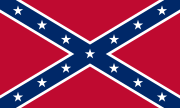| Patriot Party | |
|---|---|
| Founded | 1970; 55 years ago (1970) |
| Dissolved | Mid-1970s |
| Preceded by | Young Patriots Organization |
| Headquarters | Chicago |
| Ideology | |
| Political position | Far-left |
| Party flag | |
 | |
The Patriot Party was a socialist organization of the early 1970s in the United States that organized poor, rural whites in the Appalachian South and Pacific Northwest. The party was formed after a split with the Young Patriots Organization. The YPO's membership was drawn from street gangs of Appalachian whites in the Uptown neighborhood of Chicago, Illinois; it became politicized after working with the Young Lords, an ethnic Puerto Rican gang, and the African-American Black Panther Party.
Founding
The Patriot Party was founded in 1970 after infighting among members of the leftist Young Patriots Organization in Chicago. The group sought to improve the condition of disadvantaged whites, particularly recent immigrants, drug-users, the unemployed, welfare-recipients, blue-collar workers, and "dislocated hillbillies" who had left Appalachia.
The Patriot Party was a member of the original Rainbow Coalition, formed by Fred Hampton of the Black Panther Party and others to create a broad-based, multi-racial political coalition. It formed after the United Front Against Fascism conference held in Oakland, California, in 1969. The coalition included the Young Lords, the Brown Berets and I Wor Kuen. Hampton's intention was to have multi-ethnic gangs working together to accomplish peaceful solutions, rather than battling each other.
Strategies
The Patriot Party borrowed strategies of community organizing from the Black Panthers. For instance, they established a Free Breakfast for Children program. They established "liberation schools" to teach their ideology to children. The Eugene, Oregon, chapter, location of the University of Oregon, garnered much community support with its "Free Lumber" program. At this time in the Northwest, some poor people still relied on wood-stoves for cooking and heating, and cheap wood was hard to come by.
The Patriot Party believed that whites would abandon racist beliefs after identifying the capitalist system as their true enemy.
Use of the Confederate flag
Despite the Confederate flag's association with white supremacism, the Patriot Party used it as a symbol. In addition to easy access at military surplus stores, the flag was used, according to Amy Sonnie and James Tracy, "as a symbol of southern poor people's revolt against the owning class". Buttons with the slogan "Resurrect John Brown" – a reference to the avowed abolitionist – were also commonly used. Pamphlets contained slogans such as "The South will rise again, only this time with the North and all the oppressed people of the world."
Downfall and legacy
In 1970, the Federal Bureau of Investigation (FBI) arrested the entire central committee of the Patriot Party and charged them with various felonies. They later dropped the charges, but, by the mid-1970s, the FBI's COINTELPRO program had effectively suppressed the organization.
The group was also strongly opposed by far-right white militias.
In 1982, the civil rights activist Jesse Jackson adopted the name of "Rainbow Coalition" for organizing multi-ethnic groups to support and vote for liberal (generally Democratic) candidates for public office, in order to strengthen minority voices by acting in collaboration.
References
- Lamoureux, Mack; Makuch, Ben (January 21, 2021). "Despondent Trump Fans Find Solace in Fantasy of New 'Patriot Party'". Vice. Retrieved February 15, 2021.
- ^ Farzan, Antaonia Noori (January 25, 2021). "Trump is threatening to form the Patriot Party. That name has already been used – by 'hillbilly' socialists". The Washington Post. Retrieved February 15, 2021.
- Rankin, Alan (December 31, 2020). "What is the Patriot Party?". wiseGEEK. Retrieved January 22, 2021.
- Chapman, Roger (2011). Culture Wars: An Encyclopedia of Issues, Viewpoints, and Voices. M. E. Sharpe. p. 114. ISBN 978-0-7656-2250-1. Retrieved February 21, 2013.
- "Confederate Flag". Anti-Defamation League. Retrieved June 10, 2020.
- McWhorter, Diane (April 3, 2005). "'The Confederate Battle Flag': Clashing Symbols". The New York Times. Retrieved June 10, 2020.
- Phillips, McCandlish (February 23, 1970). "12 Are Arrested in Weapons Raid". New York Times. New York. Retrieved January 23, 2021.
- Sonnie, Amy (2011). Hillbilly nationalists, urban race rebels, and black power : community organizing in radical times. Brooklyn, N.Y.: Melville House. ISBN 978-1935554660.
External links